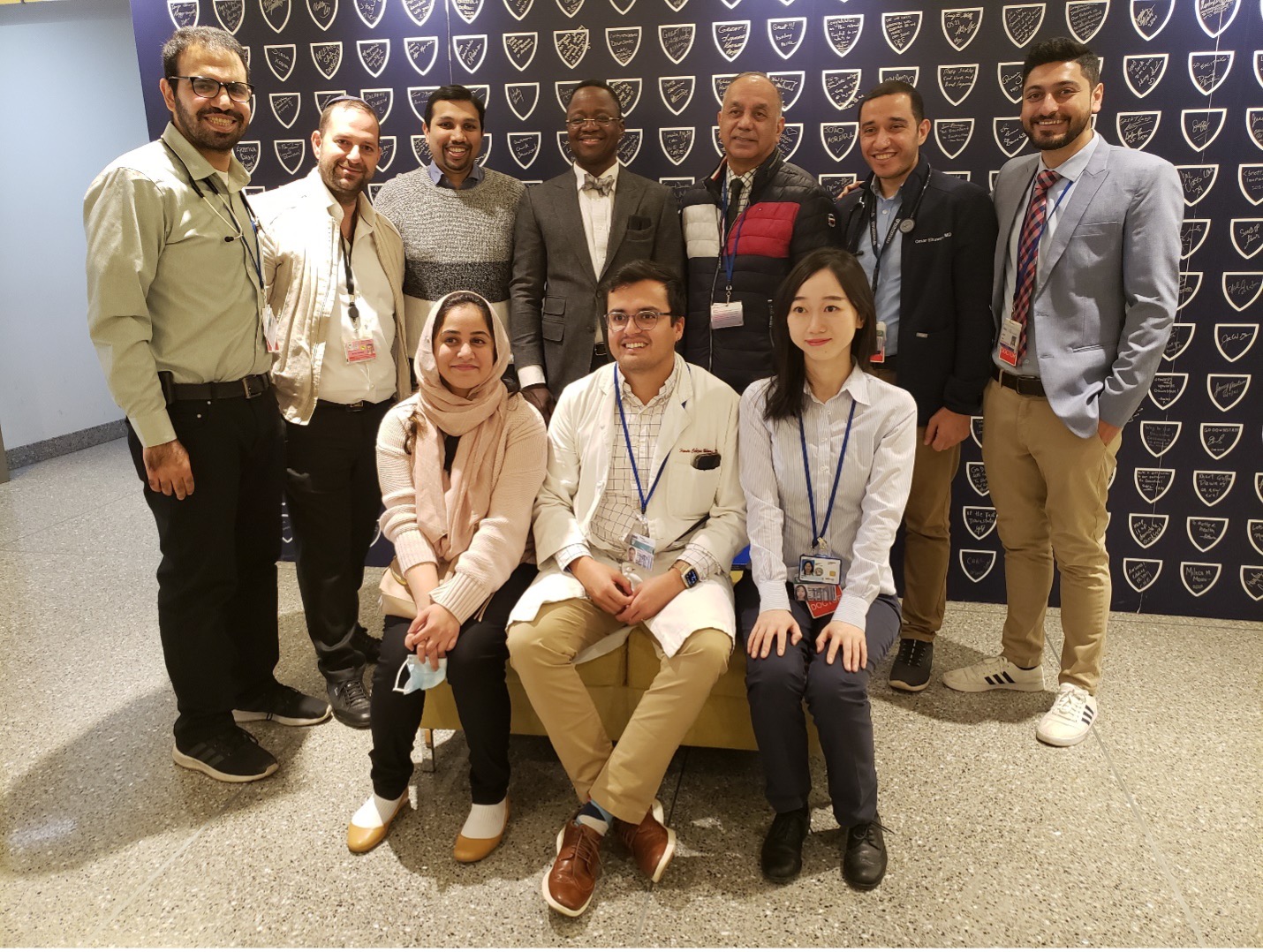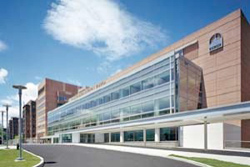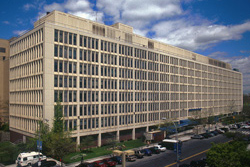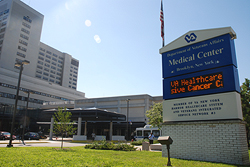Nephrology Fellowship Program

First and Second year fellow 2023
SUNY Downstate Health Sciences University is in the heart of Brooklyn, New York City's largest borough and is home to the College of Medicine, College of Nursing, School of Public Health, School for graduate studies, and School of health professions. Nephrology Fellowship is one of the several Graduate Medical Education fellowship training programs offered by SUNY Downstate and is at the core of our Internal Medicine residency program. Our Chief of Nephrology is Dr. Moro Salifu, MD, MPH, MBA who is also the Chair of Medicine. All our SUNY GME programs, including our Nephrology fellowship program are fully ACGME accredited, and all programs are academic university-based training programs with rotations at three primary sites within Brooklyn. Additional training sites have been incorporated in some GME programs to expand the exposure of our trainees to the expertise offered in those programs. The primary training site for our program is SUNY Downstate University Hospital. The borough of Brooklyn continues to be recognized for its entrepreneurial spirit, creative talent, diversity and the cultural experience it offers. SUNY Downstate has been the home to several academic scholars including a Nobel laureate Dr. Robert F Furchgott. An unusual aspect of most of our GME programs are the fellow's exposure to Federal hospital systems at the Brooklyn Veterans Administration Hospital which has 153 bed and 3 ICUs, NY State hospital systems at the Downstate University Hospital at Downstate or UHD which has 342 beds and 3 ICUs and NY City hospital systems at the Kings County Hospital Center or Kings County Hospital which has 634 beds and 5 ICU’s. Former Nephrology fellowship graduates from our program now direct several Nephrology programs in Asia, South America, Europe, Africa, and throughout the United States.
A total of 14 nephrologists are directly involved in our nephrology fellowship teaching and training program. Subodh J. Saggi, MD, MPH, Professor of Medicine serves as the fellowship director to blend teaching, training, and research into an effective program. The core Nephrology fellowship program is a 2-year training program and has 4 positions every year. We have one position in Nephrology Critical Care program which is a 3-year program with the third year dedicated entirely to Critical Care Medicine. An optional third-year additional training after Core Nephrology training is also available in transplant nephrology and interventional nephrology to selected candidates interested in practicing in those fields. Rotations in each site are almost equally distributed and experience at each site is unique and each site has a specific site director monitoring fellows teaching and training experience. SUNY Downstate offers teaching and training in interventional nephrology, kidney biopsies, kidney transplants, home hemodialysis and home peritoneal dialysis, while Kings County Hospital offers experience in trauma and neuro ICUs with extensive exposure to CRRT training, while Brooklyn VA offers training in ambulatory dialysis and bedside ultrasound training. All three sites offer continuous consultative exposure to in patient nephrology services, to continuity clinics, diagnosis and management of salt and water imbalances, acid-base abnormalities, electrolyte disorders along with diagnosis and management of patients with AKI, CKD and ESRD. CRRT dialysis and placement of femoral dialysis catheters trainings are offered at most sites so that there is ongoing exposure to these forms of renal replacement therapies and interventions. Fellows’ exposure to Plasmapheresis is available at all most sites as well. Nephrology specific Point of Care Ultrasound training (POCUS) with certification is a part of our training program. Currently we are expecting that our optional third year graduate training program in transplant and interventional nephrology programs will obtain full ACGME certification along with AST (American Society of Transplantation) and ASDIN (American Society of Interventional and Diagnostic Nephrology) certifications. Requirements for full certifications from those programs require an entire year of additional dedicated training with specific competencies. SUNY Nephrology Fellowship program also partners with one-month rotations at Mount Sinai Hospital in NYC for additional exposure and training in Home peritoneal dialysis and on an elective basis with NYU School of Medicine in NYC for exposure to multiorgan transplants, living donor chain programs and transplant kidney biopsies for those fellows interested in pursuing further training in transplant.
Responsibilities for On Calls and Continuity Clinics and Case Workloads
Duty hours are limited to 80 hours per week averaged over a 4-week period.
- Fellows will be provided 1 day in 7 free from all educational and clinical responsibilities, averaged over a 4-week period.
- Continuous on-site duty will not exceed 24 consecutive hours. Fellows may remain on duty for up to 6 additional hours to participate in didactic activities, transfer care of patients, conduct outpatient follow-up clinics, and maintain continuity of patient care.
- No new patients may be accepted after 24 hours of continuous on-site duty.
- Adequate time for rest and personal activities will be provided. This will consist of a 10-hour time period provided between all daily on-site duty periods.
When Nephrology fellows cover SUNY Downstate Health Sciences University, they also cover Kings County Hospital site. When fellows take on call at VA, they only cover the VA site.
Nephrology fellow work hours are subject to the 80 hours per week limit as stated above. Although most calls are taken from home, fellows may be required to return to the hospital to assist in the care of a critically ill patient or to perform a procedure for emergent hemodialysis. The hours the fellow spends in the hospital count toward the 80-hour limit for the week.
All fellows are required to submit their duty hours weekly in new innovations. The duty hours are regularly monitored by the program coordinator and the program director.
Weekday calls begin at 5:00 PM and end at 8:00 AM, once per week for coverages SUNY Downstate Health Sciences University and Kings County Hospital sites when on call. Weekend calls begin on Friday at 5:00 PM and end on Saturday at 5:00 PM. From Saturday 5:00 PM to Sunday 8:00 AM a fellow takes home call. However, to comply with the 10-hour free time period between all duty periods and 16-hour work hour duty limit rules fellow leaves the hospital after completion of their 16 hours on call and takes home call after that. On average fellows take on call 2–3 nights per month only.
Work hours at the Brooklyn Veterans Hospital (VA) are as follows
Daily schedule is 8:00 AM – 4:00 PM. On call coverage is home call. If the fellow is called in those hours are included in the 80 hours per week work hour restriction. One day off in 7 is completely free of any in person or home call responsibilities (not averaged). The day off may be a weekend day or weekday depending on the particular needs of the division at that time.
Case Loads: For continuity clinics 8–10 patients and for consultations in hospital 10–12 patients dependent on service needs. Usual caseloads are much less. Transplant rotation has transplant clinic responsibilities for fellows to get the exposure and training to follow patients post transplantation longitudinally. Fellows are expected to comply with all ACGME requirements of sufficient case volumes to get the training experience in all outpatient’s clinical rotations and document those cases in new innovations.
Didactic Training
Ongoing bedside teaching and Attending teaching rounds occur daily on consult service. In addition, clinical conferences, renal grand rounds and seminars as listed below are held periodically at SUNY Downstate Health Sciences University. Further small discussion groups, journal clubs and one-on-one instructions are an integral part of the Nephrology Fellowship Program. At the initiation of the fellowship program orientation lectures are provided from July 1 – September 15 on most days of the week from 7:30 AM to 8:30 AM to cover a vast number of nephrology topics. Attendance at these conferences is mandatory. The schedule of conferences after September 15, 2023, are outlined below and attendance at these conferences is also mandatory:
- Mondays, Tuesdays and Fridays 7:00 AM – 8:00 AM (Morning Report and teaching conferences and board review preparation) with Program Director.
- Tuesday 3:00 PM – 4:00PM (Journal Club or Biopsy conference) and then 4:00PM - 5:00PM (Nephrology Grand Rounds).
- Thursdays 7:30 AM – 8:30 AM (Fluid and Electrolytes).
- Thursdays 8:30 AM – 9:30 AM (Medicine Grand Rounds).
Didactic conferences, attendance at clinics and in hospital rounds are also held when on external site rotations such as Mount Sinai or NYU. Fellows need to comply with those conferences separately as well when on rotation at those sites.
Description of Training Program
The Nephrology Training Program at Downstate Health Sciences University began in 1964 and has operated continuously since. As of July 1, 2004, there will be ten (10) fellows enrolled in a two-year program. An optional third year, devoted to investigation, is contingent on gaining funding for suitable projects. Institutions participating in Downstate’s Nephrology Training Program include:
Kings County Hospital Center (Kings County Hospital, 6 months)
Kings County Hospital provides a busy inpatient and outpatient consulting service for management of acute and chronic kidney failure as well as performance of acute hemodialysis (HD), and peritoneal dialysis (PD), and continuous renal replacement (CRP) therapy, femoral cannulations and percutaneous kidney biopsies. The renal fellow is responsible for coordinating medical care of all ESRD patients. CKD care is afforded in two renal clinic sessions each week. At all times, supervision of the renal fellow is the responsibility of an attending nephrologist.
University Hospital at Downstate (UHD, 9 months)
UHD provides a full menu of renal diseases including kidney transplant related experience. Acute dialysis care is a key focus of the service, and exposure to continuous renal replacement therapy is extensive throughout the year. Off site management of severely ill patients is conducted in the Cardio-Thoracic Intensive Care Unit, the active Medical Intensive Care Unit and a busy Cardiac Catheterization/ Intervention laboratory. When the fellows are in UHD they rotate in 3 different nephrology services, which includes consult, transplant and vascular access services rotations.
Brooklyn Veterans Hospital (BVH, 6 months)
With two assigned renal fellows, the BVH rotation focuses on managing ambulatory renal patients. This rotation supervised by Dr. Goldwasser and Mari-Alex Michel provides intensive training in the mechanics and medical support of patients on chronic hemodialysis. In addition, the fellow provides primary care for the veterans with renal transplants. The two fellows take calls alternatively.
UHD Transplant (3 month)
The Transplant Service performs approximately 90 kidney transplants each year and provides hemodialysis vascular access for patients at Kings County Hospital and UHD. Renal fellows do daily rounds with a supervising transplant nephrologist. First year fellow does 1-month training and 2nd year fellow does 2 months training in transplant.
Mount Sinai Hospital (1 Month)
Nephrology second year fellows to rotate through the Home Dialysis Program at Mount Sinai School of Medicine/Mount Sinai Hospital for their training in home dialysis, which includes Home Peritoneal Dialysis as well as Home Hemodialysis. Downstate fellows will be trained in learning how to screen appropriate candidates for Home Dialysis, learn different types of procedures needed to accomplish access to either peritoneal membrane for Home Peritoneal Dialysis or vascular access appropriate for home hemodialysis therapies. Fellows will be trained with Dr. Jaime Uribarri, Home Dialysis Director. Fellows will also spend time in their outpatient Interventional facility to see PD catheters being placed under fluoroscopy, as well as observe in the Operating Room laparoscopic placement of PD catheters. Fellows will learn how to manage catheter post operatively, how to start low volume peritoneal dialysis immediate post op if needed.
Interventional Nephrology (1 month)
The fellow will gain the required knowledge and experience in managing all kinds of vascular access problems. The fellow is responsible for all dialysis patients at UHD and attends the weekly home dialysis clinics at Parkside.
Clinics:
Each fellow is expected to attend several outpatient continuity clinics: UHD, Kings County Hospital, and VA outpatient clinics. The Transplant Clinics are attended when the fellow participates on those respective services.
UHD Clinic:
Typically, each fellow sees 4–8 CKD patients during a 1/2-day clinic and follows them over a two-year period, under the supervision of Dr. Barbara G. Delano and other attendings.
Kings County Hospital Clinic:
Typically, each fellow sees 4–8 CKD patients during 1/2-day clinics on Mondays and Wednesdays and follows them over a two-year period, under the supervision of Dr. Mary Mallappallil and Dr. Akten
VA Clinic:
The fellow sees 4-8 patients during a 1/2-day clinic for each fellow every week. The fellows rotating at the VA attend this clinic, under the supervision of Dr Marie-Alex Michel and Phillip Goldwasser
Transplant Clinic:
The fellow sees 4-6 transplant patients during 1/2-day clinic under the supervision of Drs. Salifu, Saggi and Markell.
Calls:
Weekday calls begin at 5:00 PM and ends at 8:00 PM. Weekend calls begin on Friday at 5:00 PM ending at 8:00 AM Saturday and then next fellow usually senior covers the Sunday 8:00 AM to Monday 8:00 AM. However, to comply with the 10 hour and 16 hour rules (see below) the fellow leaves the hospital at completion of their work and comes back at 10 hours later in the next morning. All telephone calls from patients at night and on weekends from their homes should be discussed with the attending on call. The fellows are on call an average of five times per month.
Didactic Training:
Clinical conferences, seminars, small discussion groups, journal clubs and one-on-one instruction are integral parts of the Nephrology Fellowship Program. The schedule of conferences includes:
- Mondays, Thursdays and Fridays 11:00 AM – 12:00 PM (Morning Report)
- Tuesday 3:00 PM – 4:00 PM (Journal Club or Biopsy conference Nephrology Grand Rounds), 4:00 PM – 5:00 PM (Nephrology Grand Rounds Journal Club or Biopsy conference)
- Thursdays 11:00 AM – 12:00 PM (Fluid and Electrolytes)
- Thursdays 8:00 AM (Medicine Grand Rounds)
Duty Hours
The SUNY Downstate Health Sciences University Fellowship in Nephrology program complies fully with the ACGME duty hour guidelines. These guidelines are summarized as follows:
- Duty hours are limited to 80 hours per week averaged over a 4-week period.
- Fellows will be provided 1 day in 7 free from all educational and clinical responsibilities, averaged over a 4-week period.
- Continuous on-site duty must not exceed 24 consecutive hours. Fellows may remain on duty for up to 6 additional hours to participate in didactic activities, transfer care of patients, conduct outpatient follow-up clinics, and maintain continuity of patient care.
- No new patients may be accepted after 24 hours of continuous duty.
- Adequate time for rest and personal activities will be provided. This will consist of a 10-hour time period provided between all daily duty periods.
Nephrology fellow work hours are subject to the 80 hours per week limit as stated above. Although call is taken from home, fellows may be required to return to the hospital to assist in the care of a critically ill patient or to perform a procedure. The hours the fellow spends in the hospital count toward the 80-hour limit for the week.
All fellows are required to submit their duty hours weekly in new-innovation. The duty hours are regularly monitored by the program coordinator and the program director.
First year fellow takes Friday and Saturday call and Second year fellow takes Sunday calls.
Clinical Rotations
|
Kings County Hospital consultations |
University Hospital consultations |
Veterans Administration |
Sample of Weekly Activities for Fellows (PDF)
Applications/Information
- Only completed applications, including letters of recomendation and USMLE scores will be considered.
Subodh J. Saggi, MD, MPH, FACP, FASN
Professor of Medicine, Director of Nephrology Fellowship Program
Department of Nephrology
Moro O. Salifu, MD, MPH, MBA, MACP
Professor and Chair of Medicine, Chief of Nephrology Division,
Director of Interventional Nephrology
SUNY Downstate Health Sciences University
450 Clarkson Avenue Box 52
Brooklyn, New York 11203
Phone: (718) 270-2848
FAX: (718) 270-3327
For more information contact: renal.fellowship@downstate.edu


